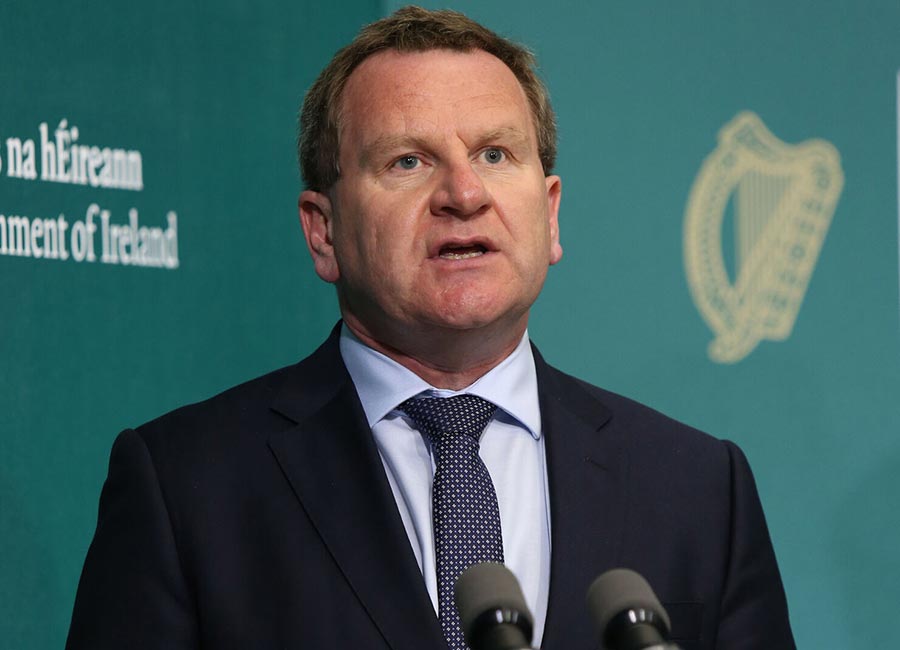The head of employers group Ibec has described the EU-US trade deal as a "capitulation" that will result in an effective €11bn transfer of tax across the Atlantic.
Speaking on Morning Ireland, Danny McCoy said it was a good deal in that it removes uncertainty for businesses but "really bad" in the long term.
"The good news, if there is good news on this, is that uncertainty may be dissipating and that's going to be important for people in business to make decisions," he said.
However, he added that the agreement was "fairly punishing" for the EU and that "Europe has capitulated".
McCoy identified a benefit to European consumers, who will no longer have to cope with any retaliatory measures from US President Donald Trump, but he believes that the additional costs to European businesses created by tariffs will be paid by US consumers.
In a statement on Sunday, European Commission president Ursula von der Leyen confirmed the broad tenets of the agreement: an "all-inclusive" 15 per cent tariff on EU goods entering the US, displacing all previous tariffs announced by Trump
The White House had been due to enforce a 30 per cent tariff on EU goods prior to a revised deadline on Friday (August 1).
Products such as aircraft and aircraft components, semiconductors, certain chemicals and pharmaceuticals, natural resources and critical raw materials and certain agricultural products will benefit from "zero-for-zero tariffs".
Which specific products benefit from tariff-free trade is still to be announced, but Ireland's €44bn in annual pharmaceutical exports look to have escaped sanction despite Trump's desire to bring pharma manufacturing back to the US.
However, Trump has ordered investigations into pharma and semiconductor imports on the basis of national security, the outcomes of which could result in further levies.
The deal also includes quotas requiring Europeans to purchase US steel, aluminium, liquified natural gas, oil, nuclear fuels, and AI chips, as well as $600bn in American military equipment.
"It’s quite tragic that we are in this situation. If Europe had equal strength, it could have confronted the United States," said McCoy.
He added that while the EU is "a strong economic zone," it had been undermined in negotiations but its inability to defend itself without US support.
"US businesses are now favoured coming into Europe without tariffs and our European businesses are facing 15%," he continued.
"In time, this will lead to a lot of changes in terms of businesses having to look at different markets than the United States or suffer significant losses trading with the United States."
He also expressed concern that the UK secured a lower ten per cent tariff in its negotiations with the US, creating an advantage for exporters in Northern Ireland.
von der Leyen said the agreement provides "much-needed clarity" for EU citizens and businesses and described Trump as both "a tough negotiator" and "a dealmaker". Trump himself said the deal was the "biggest in the world," and a "good deal for everybody."
Taoiseach Micheál Martin said the agreement brings "clarity" and protects Irish jobs.
Tánaiste Simon Harris also welcomed the deal but conceded that the 15 per cent tariff is regrettable.
Also speaking on Morning Ireland, Deloitte Ireland chief economist Kate English said that EU-US trade had been "fundamentally changed" by the deal and that there would be pain for both Irish and European businesses.
Beyond the tariffs, the increasing strength of the euro against the US dollar -- against which it is up 13 per cent in value this year to date -- will make it even more expensive for American businesses to buy European goods.
It remains to be seen whether Brexit-style supports will be provided to Irish businesses who export heavily to the US to help them source new markets and invest in research and development.
In its official response to the deal, Ibec said the tariff represents "a substantial burden for many industries".
"Sectors which rely heavily on the US market and operate within small margins, will once again be significantly impacted by an additional five per cent tariff, on top of what they have already had to absorb over the past several months and well in excess of the one per cent effective tariff which existed before April."
"Our message to the government, as it was with the ten per cent tariff, is that the most exposed sectors will require support similar to the interventions provided as a response to Brexit.
"It is important to note that details are still emerging and will only be worked out as today’s framework is fleshed out.

"These details will be critically important for Ireland. Pharmaceuticals and semiconductors, which equate to 75 per cent of Ireland-US trade, are, we understand, included in the 15 per cent deal.
"However, there is still a question around the stability of that rate over both the short and long-term in the face of ongoing Section 232 investigations."
Photo: US President Donald Trump and President of the European Commission Ursula von der Leyen shake hands as they announce a US-EU trade deal after a meeting at Trump Turnberry golf club on July 27, 2025 in Turnberry, Scotland. (Pic: Andrew Harnik/Getty Images)









